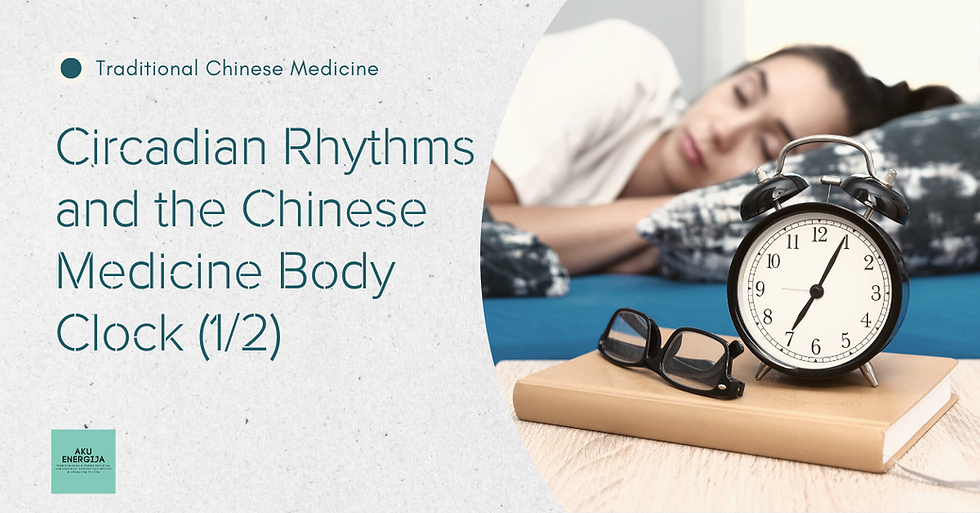Circadian Rhythms and the Chinese Medicine Body Clock (1/2)
- Aku Energija
- Apr 21, 2023
- 4 min read
Circadian rhythms are 24-hour cycles that are part of the body’s internal clock, running in the background to carry out essential functions and processes. One of the most important and well-known circadian rhythms is the sleep-wake cycle.

Different systems of the body follow circadian rhythms that are synchronized with a master clock in the brain. This master clock is directly influenced by environmental cues, especially light, which is why circadian rhythms are tied to the cycle of day and night.
Research is revealing that circadian rhythms play an integral role in diverse aspects of physical and mental health.

What are circadian rhythms?
Circadian rhythms are physical, mental, and behavioral changes that follow a 24-hour cycle. These natural processes respond primarily to light and dark and affect most living things, including animals, plants, and microbes. Chronobiology is the study of circadian rhythms. One example of a light-related circadian rhythm is sleeping at night and being awake during the day. The Average Teen Circadian Cycle image shows the circadian rhythm cycle of a typical teen.
What are biological clocks?
Biological clocks are organisms’ natural timing devices, regulating the cycle of circadian rhythms. They’re composed of specific molecules (proteins) that interact with cells throughout the body. Nearly every tissue and organ contains biological clocks. Researchers have identified similar genes in people, fruit flies, mice, plants, fungi, and several other organisms that make the clocks’ molecular components.
What is the master clock?
A master clock in the brain coordinates all the biological clocks in a living thing, keeping the clocks in sync. In vertebrate animals, including humans, the master clock is a group of about 20,000 nerve cells (neurons) that form a structure called the suprachiasmatic nucleus, or SCN. The SCN is in a part of the brain called the hypothalamus and receives direct input from the eyes.
What Happens When Circadian Rhythm Is Off?
When circadian rhythm is thrown off, it means that the body’s systems don’t function optimally.
A disturbed sleep-wake circadian rhythm can give rise to serious sleeping problems. Without the proper signaling from the body’s internal clock, a person can struggle to fall asleep, wake up during the night, or be unable to sleep as long as they want into the morning. Their total sleep can be reduced, and a disrupted circadian rhythm can also mean shallower, fragmented, and lower-quality sleep. [Read more: 9 Tips to promote sleep]
What Can Disrupt Circadian Rhythm? [1]
Disruptions to circadian rhythm can occur over the short- or long-term. Experts have identified a number of types of circadian rhythm sleep-wake disorders (CRSWD) based on their characteristics and causes.
Work shift work. People who work from late afternoon until late night or overnight (commonly called the graveyard shift), such as healthcare workers, often have circadian rhythm issues.
Have irregular or erratic schedules that can swing between late nights and early mornings.
Travel frequently, across multiple time zones.
Experience high levels of stress on an ongoing basis.
Have dementia, brain damage or head injuries.
Take certain medications, including some sleeping aids.
Have inconsistent sleep routines and poor sleep hygiene.
How do circadian rhythms affect health?
Circadian rhythms can influence important functions in our bodies, such as:
Hormone release
Body temperature
Most people notice the effect of circadian rhythms on their sleep patterns. The SCN controls the production of melatonin, a hormone that makes you sleepy. It receives information about incoming light from the optic nerves, which relay information from the eyes to the brain. When there is less light—for example, at night—the SCN tells the brain to make more melatonin so you get drowsy.
Over time, being out-of-sync with your body clock can increase your risk for obesity, cardiovascular disease, diabetes, gastrointestinal problems, neurodegenerative disorders (including dementia), skin issues and more.
Stay in tune with the circadian rhythms
With some time and consistent effort, most people can reset their circadian rhythm and get their body back in balance with their internal clock. Many of the recommended steps are similar to the good sleep habits we should be striving for:
Expose yourself to the sun first thing in the morning. This alerts the cells to the change in light, which in turn signals the brain that it is time to wake up.
Get a daily dose of exercise. Exercise supports the normal flow of your internal body clock, and may also help increase cortisol production to keep you alert during the day. [Read more: TCM healthy exercise - Ba Duan Jin]
Avoid screens for at least an hour before bedtime. The blue light emitted from screens can suppress melatonin production and keep you from feeling sleepy at your normal bedtime.
Avoid alcohol, nicotine and caffeine in the afternoon and evening. Everyone reacts differently to these substances, so try cutting them out after 2 p.m. and see how your sleep is impacted. [Read more: TCM Dietary advice]
Make sure you sleep in a cool room that is quiet and completely dark. Even the light from computers or clocks can send conflicting signals to your brain, so cover any light with a scarf or towel to keep it from interfering with your sleep.
Talk to your doctor about any medications you take that may disrupt your circadian rhythm — including sleep aids. There may be another alternative, such as a different medication, exercise or therapy that may help with some issues.
https://www.elcaminohealth.org/stay-healthy/blog/how-circadian-rhythm-affects-your-sleep-and-health







Comments